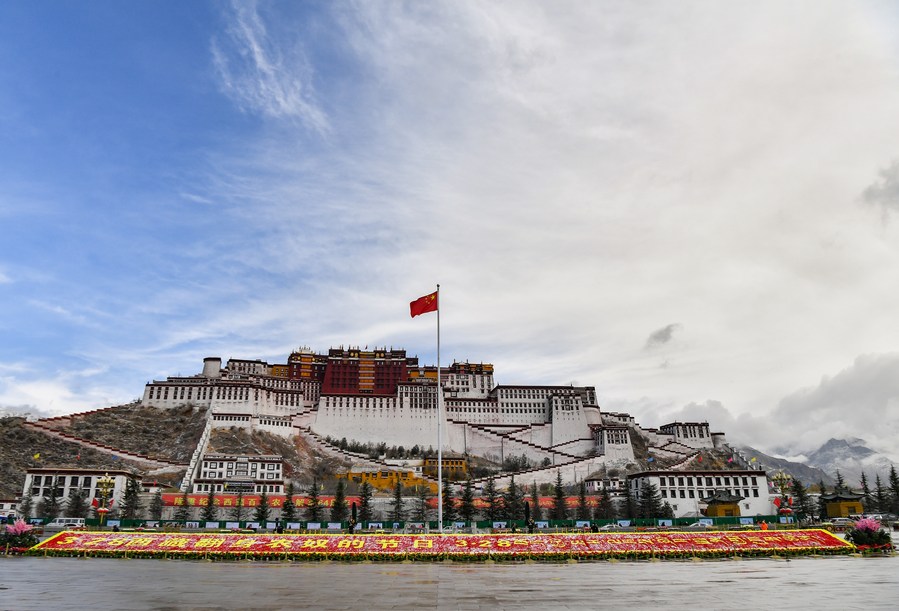Source:Xinhua 2023-06-13

The Potala Palace is pictured on the occasion of the 15th Serfs' Emancipation Day in Lhasa, capital of southwest China's Tibet Autonomous Region, March 28, 2023. (Xinhua/Jigme Dorje)
by Roland Boer
BEIJING, June 7 (Xinhua) -- I participated in a research field trip to Tibet Autonomous Region last month, and all of the participants found the development of Tibet to be extraordinary.
Visiting Tibet, you are able to gain a firsthand account of what is actually happening and see clear and objective evidence of its development.
Everywhere I turned, there was clear evidence of Tibet's economic development: new and upgraded roads; a rail network on the roof of the world; innovative achievements in high-altitude electricity and telecommunications provision; continuous building projects that reflect Tibetan style.
In regard to economic development, this region has laid a solid foundation for a comprehensive approach to development. One example of this would be the realization of poverty alleviation. Looking at education, we can also see massive improvements. Whilst we visited numerous schools and a university, the expertise of the teachers along with the quality of the state-of-art equipment became very evident.
Tibet's unique culture is also flourishing, with both preservation of its intangible cultural assets and creative innovations of cultural traditions. It's apparent that the educated workforce, along with innovation and creative solutions, will be instrumental in enhancing Tibet's economic development.
With economic, educational, and cultural development, people are able to engage more fully in democratic processes -- particularly, in the whole-process people's democracy in the context of China as a whole.
This region of China was liberated 72 years ago and began the process of democratic reform in 1959. Before 1959, Tibet had no form of democracy, so the development of electoral, consultative, and grassroots democracy in Tibet is a huge step forward.
One particularly noteworthy point is the process of making the decision to relocate. This is not an easy decision, since the old villages were home to generation after generation of local families. Here grassroots democracy is crucial: all possibilities are considered, the pros and cons are discussed and debated, the concerns of all are taken into account, and the final decision is reached via a consensus.
The whole-process people's democracy includes the promotion of a socialist approach to justice and rights. The core human right is the right to socio-economic well-being, or "common prosperity."
As mentioned earlier, one of the most lasting impressions is the stunning economic development of Tibet. It is one thing to read about this development; it is quite another to experience it firsthand. In light of this economic development, it should be no surprise that by the end of 2019, Tibet had already overcome absolute poverty and is now on the path to common prosperity.
I observed earlier that Tibet's culture is flourishing in a creative way, educational quality is notably improving and of a high level, and people can engage in an informed and productive way in the whole-process people's democracy. I would add here that in Tibet, ecological programs are making significant developments and world-class breakthroughs -- or what we know as ecological civilization. In other words, on the basis of socio-economic well-being, Tibet is experiencing a notable and comprehensive increase in civil, political, cultural, and environmental rights.
To conclude: if "whole-process people's democracy" means "putting people at the center," it is an objective fact that Tibet's comprehensive development has been resolutely people-centered.
Editor's note: Roland Boer is an Australian professor at the School of Philosophy of Renmin University of China.